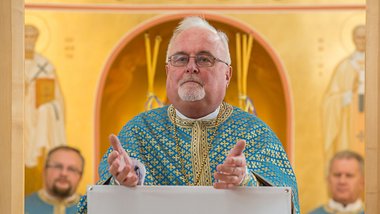“In reality, there is no contradiction between the interests of an autonomous church and the universal church.”
A talk with Archbishop YOAN (Modzalevskyi), head of the Theological-Canonical Commission of the Ukrainian Autocephalous Orthodox Church (UAOC), and Ukrainian Orthodox Church-Moscow Patriarchate (UOC-MP) priest Fr. Petro ZUYEV, director of the Center of Theological Studies, both of whom participated in the negotiation process between the UOC-MP and UAOC.
On the dialogue between the Ukrainian Autocephalous Orthodox Church and Ukrainian Orthodox Church-Moscow Patriarchate
It appears that there is no progress at all in the negotiations between the UOC-MP and UAOC. Is this really so?
Archbishop Yoan:No, we simply do not seek to speed up events. The church’s rhythm differs from that of politicians. For we aim not to attain the establishment of a political bloc but church unity. And that is a unity of a qualitatively different order.
Fr. Petro Zuyev:An election campaign is going on in Ukraine. Life is extremely politicized, whereas negotiations require a quiet atmosphere. Therefore, I think it is better to wait for political passions to subside and to hold another round of negotiations.
Were you able to attain anything concrete? Were any models of unification developed?
Archbishop Yoan: Theoretically, such models exist. But we have not yet reached the level of the negotiation process where there is sense in discussing them. Today, we are faced with a task of no less importance, to attain common theological ground and a common ecclesiological vision.
Fr. Zuyev: Adding to what the bishop has said, I would like to stress that the UAOC and UOC[-MP] have made considerable progress in this regard. And in many respects, it is thanks particularly to the UAOC, specifically, its Theological-Canonical Commission headed by Archbishop Yoan. In particular, it is very good that UAOC hierarchs clearly define the meaning of the notion “autonomous [pomisna] church” as they make correct theological stresses on the correlation between the “national” and “universal” principles in the church.
What do you make of the prospects for unification? Will the UAOC and UOC-MP attain common ground and reach unity ignoring the Ukrainian Orthodox Church-Kyivan Patriarchate (UOC KP) in their dialogue?
Fr. Zuyev: To ignore anything is a non-ecclesiastical and artificial and secondary position. Neither are our negotiations to be aimed at “harming” the UOC KP. The goal should be positive: it is necessary to find a way out of the present tragic situation in Ukrainian Orthodoxy, when every third Orthodox parish is in canonical isolation. None of us is against negotiations with the UOC KP in principle. But today such negotiations are not yet possible for many reasons.
Archbishop Yoan: Father has said correctly. Our objective is not friendship in opposition to [Patriarch] Filaret [Denysenko, head of the UOC-KP], but development of an ecclesiological and canonical position which would lead us to unity, including parishes which are now part of the UOC-KP.
But is there a prospect of unification and can you point out to any time when it could happen?
Fr. Zuyev: The head of the UAOC, Metropolitan Mefodii [Kudriakov] says that we should take advantage of the time when the UOC-MP is headed by Metropolitan Volodymyr [Sabodan]. He is a very authoritative hierarch in the Orthodox world and a unique person combining in himself deep theological thinking and personal prayer experience. This position is very familiar to me.
Archbishop Yoan: The authority of Metropolitan Volodymyr is undisputable. And this is very important for negotiations and possible unification in future. Fr. Petro was right to note that Metropolitan Volodymyr is known for his deep theological thinking, but I would also like to note that it is very important that he is a theologian of ecclesiology. A schism is an ecclesiological problem, and we are to solve it adequately by theological means in order to get out of the schismatic situation with an enriched vision of the nature of the church, particularly its unity.
Are there any alternative versions of further developments? For instance, renewal of the UAOC’s dialogue with Constantinople?
Аrchbishop Yoan: There are always “alternative versions” in life. Our hierarchs undoubtedly hope for fruits of the dialogue with the UOC[-MP]. However, this does not exclude a dialogue with Constantinople. It is not a secret that most believers of our church in western Ukraine view the Patriarchate of Constantinople as the mother church. At the same time, we would not like the dialogue with Constantinople to complicate our relations with the UOC[-MP].
Fr. Zuyev: There are two views on matters. According to political logic, Moscow and Constantinople are to be viewed as two competing centers in the Orthodox world. However, this is not so in reality. They are two expressions of the one universal church. Both patriarchates can be useful for the unification process. They only need to be guided not by their own so to say confessional interests but the interests of Orthodoxy in Ukraine.
But how should one formulate that interest?
Fr. Zuyev:There is a basic structure in the church. It is the eparchy. Therefore, the interest of the Ukrainian church is the interests of the Orthodox eparchies in Ukraine and not of any particular ecclesiastical see. Therefore, in my view, one is to be guided by the interests of the eparchies. What are these interests? First of all, church unity. Secondly, I would say, progress in missionary work.
Archbishop Yoan: In reality, there is no contradiction between the interests of an autonomous [pomisna] church and the universal church. The church lives in love. However, as we study history, we can notice that sometimes church centers make mistakes as they identify the church’s interest with the interest of their native ethnic or political community. That is exactly why theological priorities in thinking are so important. Theology unites, whereas politics separates.
Therefore, one should hope for positive political circumstances for continuation of the dialogue. Thank you for the talk.
Interviewer: Taras ANTOSHEVSKYY.
The forum was held as a skype-conference, Lviv-Kyiv-Moscow, on 31 August 2007.









